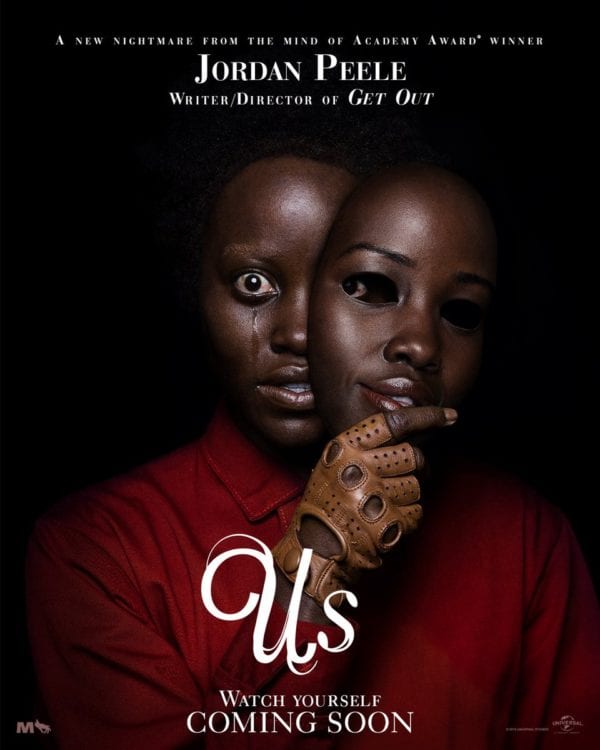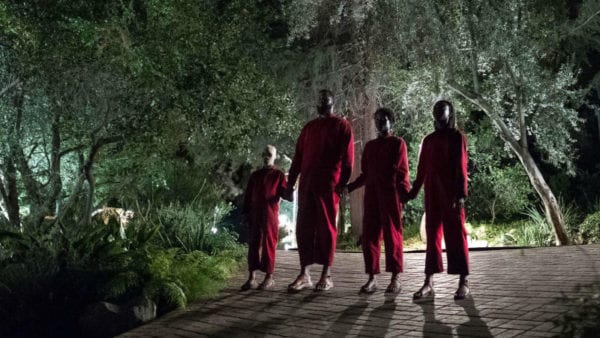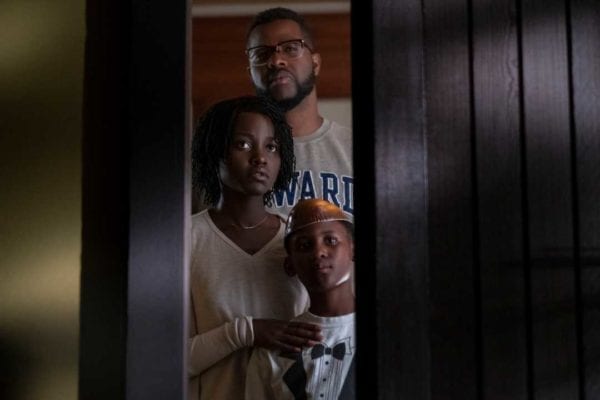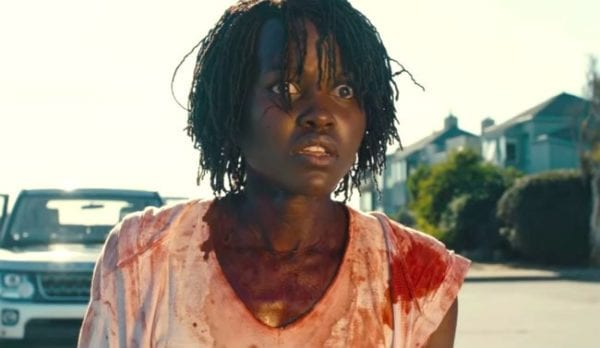Us, 2019.
Written and Directed by Jordan Peele.
Starring Lupita Nyong’o, Winston Duke, Evan Alex, Shahadi Wright Joseph, Elisabeth Moss, Tim Heidecker, Kara Hayward, Anna Diop, Cali Sheldon, Noelle Sheldon, Madison Curry, and Yahya Abdul-Mateen II.
SYNOPSIS:
A family’s serenity turns to chaos when a group of doppelgängers begins to terrorise them.
Following up an Oscar-winning pop-culture phenomenon of a directorial debut is an unenviable task for any filmmaker, but given the creative brio on display in Jordan Peele’s Get Out, it was easy to have faith that his sophomore effort would, in the very least, deliver more of the same.
But Peele’s Us is paradoxically easier and tougher to categorise than his previous film, a broader and more straight-skewing horror jaunt, albeit one which also makes a greater effort to obfuscate the precise nature of what the writer-director wants to say. It is by turns a much trickier beast of a film – arguably touting a more intriguing premise, albeit one which doesn’t feel quite so air-tight in execution. Held up against most contemporary horror, though, Us works far more often than not.
The less said about the intricacies of the narrative the better, so know simply that Peele’s set-up sees a married couple, Adelaide and Gabe (Lupita Nyong’o and Winston Duke), heading to their summer beach house for a vacation, along with their children Zora (Shahadi Wright Joseph) and Jason (Evan Alex). One night, the family unit finds themselves assailed by a quartet of doppelgängers kitted out in red robes.
Doppelgängers have of course been ripe subject matter for the horror genre for decades, asking questions of identity and the nature of the self as they inherently do, and Peele’s film is at its strongest earlier on when keeping the precise mechanics of this scenario ambiguous. If Us is surprisingly tepid as a horror film – the attempts at suspense feel weirdly loose and Peele is fairly shy when it comes to gore – there is an undeniably unnerving quality to the four-times-two performances at the core.
Through and through, Us is powered by Lupita Nyong’o’s remarkable front-and-centre work. Without going into too much detail for the sake of spoilers, Nyong’o is required to nail some very specific aspects of human emotion in order to sell the central duality, and to make certain facts more ably apparent on a second viewing (yes, like Get Out, this rewards introspection and repeat watches). Even when Peele’s screenplay ties itself in unnecessary knots and dabbles in pure genre schlock territory, her work here is unwaveringly committed, visceral and unsettling.
And the rest of the cast aren’t slouches either; Winston Duke, introduced to mainstream auds last year in Black Panther, is effective comic relief in the husband role, while admittedly getting disappointingly little to do in his fairly ho-hum doppelgänger equivalent. More interesting in this regard is the floor given to their screen children, Joseph and Alex, who like Nyong’o are given more full-bodied doubles to explore, and that they do splendidly. Elisabeth Moss and Tim Heidecker also shine in smaller supporting parts as Adelaide and Gabe’s vulgar, boozed-up married couple pals.
It’s worth nothing that Us is a solid step up technically from Get Out, with Peele clearly making a far greater effort to carve out a delineated style for himself. Get Out‘s shot compositions were never less than competent yet seem rather journeyman-like compared to the more inspired work here, aided by evocative lensing from the talented Mike Gioulakis (It Follows, Split), and Nicholas Monsour’s tack-sharp editing, which really comes into its own in the film’s head-trip of a third act.
Where Peele’s second film feels less-steady, unexpectedly enough, is its script and the general execution of its tantalising concept. While it made sense for Get Out to dispense with the mystery and go full Twilight Zone in act three, it feels like a wrong-headed approach for a story less-explicitly and more-subtly tied to a particular social commentary.
And ultimately, it comes down to the simple fact that Peele’s explanation for the doppelgängers’ presence isn’t terribly interesting or satisfying. Over-explaining need not be a major problem if that desire to unload comes from a place of real inspiration, but the final reel drops a heap of needless exposition in the audience’s lap, and the result is likely less-than had Peele simply kept things mysterious and elliptical.
Some will argue that seeking cast-iron logic in a story this inherently barmy is a fool’s errand, and that it requires audiences to simply embrace its loopy magical realism and enjoy the rollercoaster ride. But rules are important, and though on appearances Us plays fair for its first hour-and-change, the third act over-complicates itself with a deep-lore explanation that isn’t really warranted.
It is a testament to the technical and performative craft on display that the film is still as entertaining as it is despite being a decisive rung or two below Peele’s debut. The chorus of “it’s no Get Out” criticisms do, however, smack unavoidably of audiences – critics and general punters alike – struggling to fully take this movie on its own terms (this critic included).
If you’re hoping for the same straight fire that made Peele’s previous film land with such force, Us is categorically not that movie, but if you enjoy well-crafted horror with some mildly ambitious ideas about both the genre and the world at large, it’s a rock solid effort.
If markedly less persuasive than Jordan Peele’s mesmerising debut, Us nevertheless beguiles with its entrancing mystery and remarkable performances.
Flickering Myth Rating – Film: ★ ★ ★ / Movie: ★ ★ ★ ★
Shaun Munro – Follow me on Twitter for more film rambling.

















